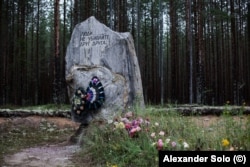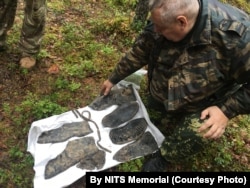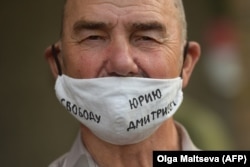Amidst a comeback in Russian veneration for Soviet dictator Josef Stalin, supporters of 64-year-old Russian historian and rights activist Yury Dmitriyev contend that his conviction this week on sexual assault charges stems from his ongoing investigation into the execution of thousands of people in northwest Russia’s Karelia region during the Stalin-era Great Terror.
Honoring the memory of those who died and were executed during the Great Terror of the 1930s is what “today they wish us not to remember,” commented writer Lyudmila Ulitskaya, referring to the Russian government.
Yury Dmitriyev, sentenced on July 22 by the Petrozavodsk City Court to three and a half years in prison for allegedly sexually assaulting his adopted daughter, has been at the center of efforts to preserve memories of the Great Terror, rather than of Josef Stalin as the “Great Leader.”
In the late 1990s, Dmitriyev and investigators from the non-governmental human-rights group Memorial uncovered a large burial site in the Krasny Bor forest south of the Karelian city of Petrozavodsk and, some 200 kilometers to the northeast, a separate site for executed prisoners from the Solovetsky labor camp. Various ethnicities were executed at both locations.
Set in a pine forest, not far from Lake Onega, the second site, called Sandarmokh, has since become a controversial memorial to the roughly 10,000 people buried there.
In the summer of 2016, Petrozavodsk State University historian Yury Kilin
advanced a theory, soon championed by pro-Kremlin media and the Defense Ministry’s official Zvezda (Star) newspaper, that Soviet prisoners of war had been shot and buried at Sandarmokh by Finnish troops during their 1941-1944 occupation of Karelia, RFE/RL’s Matthew Luxmoore has reported.
Calls subsequently began for the government-aligned Russian Military Historical Society to begin excavations.
The prosecution of Dmitriyev, head of the Karelia branch of Memorial, which had been designated a “foreign agent,” and the most outspoken advocate for preserving Sandarmokh, coincided with this campaign.
In December 2016, the first criminal charges were brought against Dmitriyev: child pornography involving photos of his underage daughter naked. He countered that the photos had been taken to document her health and physical condition.
In April 2018, Dmitriyev, who maintained his innocence, was acquitted of these charges, but sentenced to probation on a lesser charge of illegal possession of shotgun parts.
Prosecutors, however, won an appeal of the ruling, and soon came up with new charges. In June 2018, Dmitriyev was accused of sexual assault against his adopted daughter.
To substantiate their latest claims, prosecutors cited testimony from the girl, whose age and complete name have not been released, about her father allegedly touching her genital area. Doubts have been raised, however, about the consistency of this testimony and whether the girl was questioned fairly.
Specialists never found grounds for considering Dmitriyev either sexually abusive or a pedophile. The motivation for his alleged actions has not been established by either his daughter’s testimony or psychiatric evaluations of the historian, underlined sexologist Lev Shcheglov.
“This leads me to think that something in the case isn’t right,” Shcheglov commented to Current Time.
The historian rejected the latest accusations against him as also fabricated.
Given time already served in prison awaiting trial, Dmitriyev should be released from custody in November 2020, his lawyer, Viktor Anufriyev said. Some of his supporters see that as an implicit acquittal since prosecutors had demanded a 15-year sentence.
But rights organizations have warned that the Dmitriyev case is part of a larger problem confronting Russia.
“The authorities seek to discredit projects that commemorate Stalin’s victims that are at odds with the authorities’ view of the Stalin era,” Hugh Williamson, the Europe and Central Asia director for the New-York-City-based Human Rights Watch, charged in a July 21 statement.
Memorial agrees. What government official, if any, ordered retaliation against Dmitriyev is not known, but officials “negatively” interpreted the historian’s efforts to preserve the history of Stalin-era abuses in Karelia and to foster “international cooperation” on the topic, commented Sergei Davidis, a Memorial board member.
“He became an even more unacceptable figure for local authorities,” Davidis added. “And that’s a possible motive” for the charges against him.
The Russian Military Historical Society “is actively trying to destroy” the Sandarmokh memorial and, without factual grounds, trying to prove that it is “not a memorial to victims of the Stalinist repressions, but a memorial to victims of the Finnish occupants” in Karelia during World War II, Davidis charged.
With the Defense Ministry, the Society began excavations at the site, dislodging some existing remains, in the summer of 2018.
The Moscow-based Society, the descendant of an eponymous, tsarist-era organization, is a group partnered with the Russian Defense Ministry, Foreign Ministry, and Culture Ministry, as well as a series of government-run museums. It lists as its top priority assisting the government with policy, projects, and legislation related to Russia’s military history.
Russia’s revised constitution, approved by President Vladimir Putin, has made honoring the memory of those who fought for the Soviet Union against Nazi Germany a matter of both policy and law.
In keeping with those aims, a few weeks before Dmitriyev’s July 22 sentencing, the Russian Military Historical Society again denounced Memorial and Dmitriyev for not accepting that Soviet POWs also lie at Sandarmokh.
“They tried to carefully conceal their crimes,” said Yury Nikiforov, head of the Society’s scientific department, the state-run Vesti news site reported on July 3. “They tried to carefully conceal the fact that the Finnish army, as the occupier, violated the customs of a land war.”
In April, Russia’s Investigative Committee, the country’s primary investigative organ, opened a criminal case into the alleged massacre of Soviet military prisoners and civilians in Finnish-run concentration camps in Karelia.
The Finnish Foreign Ministry has requested access to the documents that motivated the Investigative Committee’s decision, but the case’s current status is unclear. It has disappeared from the Investigative Committee’s website, RFE/RL’s Russian Service reported.
Yet, aside from the struggle over Sandarmokh’s past, one of Dmitriyev’s supporters sees additional cause for concern.
The historian plans to publish lists of the names of Stalin-era executioners. Anatoly Razumov, the director of the Russian National Library’s Returned Names project, which focuses on establishing the identities of those executed during the Soviet era, told openDemocracy in 2017 that he could not “ exclude the possibility” that these lists “could have played a role” in the initial child-pornography charges against Dmitriyev.
He had earlier published such lists in the late 1990s, under the relatively more liberal era of Russian President Boris Yeltsin.
But under Putin, little suggests that such a publication would not provoke harsh condemnations from those now attempting to “rehabilitate” Soviet history.
In the Urals city of Yekaterinburg, leaflets denouncing Dmitriyev have replaced the plaques removed this year from the last residences of some of these victims, Memorial’s Davidis said.
To the northwest, in the city of Perm, the country’s only museum dedicated to the Soviet gulag, Perm-36, has had its focus switched from the harsh labor-camp regime of the Stalin era to the facility’s role in contributing timber to the Soviet Union’s war effort during World War II.
Further west, in the town of Tver, plaques marking the Stalin-era execution of thousands of Polish army officers and Soviet citizens were removed this spring; reportedly, on the orders of the local prosecutor’s office.
“This is all part of the current information policy of presenting all of Soviet history as a sequence of glorious achievements, great victories,” said Memorial historian Aleksandr Guryanov. “At the same time, the authorities are trying to push the memory of the Soviet regime’s gravest crimes into oblivion."
Some of Dmitriyev’s supporters see a similar scenario in his prosecution.
The government’s pursuit of Dmitriyev, concluded writer Ulitskaya, is “shameful for the authorities, it’s shameful for the country, it’s shameful for all of us because we all, in general, allowed this” to happen.








Facebook Forum